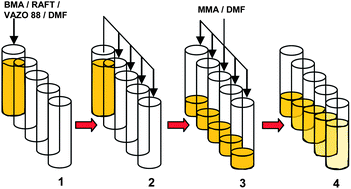Block copolymers are interesting materials that can self-assemble and segregate on nanometer length scales. This makes them ideal materials for numerous applications ranging from conventional technologies to emerging nanotechnologies. The synthesis of block copolymers is generally achieved via “living” ionic polymerization techniques or reversible-deactivation radical polymerization methods. However, the synthesis of well-defined block copolymers is, in general, a relatively low throughput, demanding, expensive and time-consuming process.
In this context, Chiefari and co-workers reported a convenient synthetic method for the systematic preparation of quasi-diblock copolymer libraries utilizing a sequential reversible addition–fragmentation chain transfer (RAFT) polymerization strategy. This approach used a commercially available parallel synthesizer, which allowed the unattended and fully automated synthesis of these libraries in a short period of time. The materials obtained in this investigation have shown properties very similar to those expected in “pure” diblock copolymers as determined by differential scanning calorimetry. The described method can be a useful and less expensive alternative for the rapid preparation and screening of block copolymer libraries.
Quasi-block copolymer libraries on demand via sequential RAFT polymerization in an automated parallel synthesizer by Carlos Guerrero-Sanchez, Lisa O’Brien, Colin Brackley, Daniel J. Keddie, Simon Saubern and John Chiefari, Polym. Chem., 2013, 4, 1857-1862.
Julien Nicolas is a guest web-writer for Polymer Chemistry. He currently works at Univ. Paris-Sud (FR) as a CNRS researcher.











